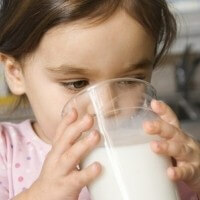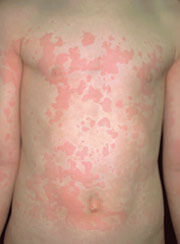Allergy to milk
 Allergy to milk - has received in recent years a fairly widespread allergic reaction of the human body to a milk protein called casein, and in some people there is only intolerance to cow's milk, while goat or sheep's milk they perceive quite normally, but other people on the contrary, React absolutely to all dairy products.
Allergy to milk - has received in recent years a fairly widespread allergic reaction of the human body to a milk protein called casein, and in some people there is only intolerance to cow's milk, while goat or sheep's milk they perceive quite normally, but other people on the contrary, React absolutely to all dairy products.
Pediatricians have been found and proven that in the case of early introduction into the diet of a baby milk formula based on cow's milk and cow's own milk itself, it is the most significant factor affecting the number of allergic diseases. Allergy to milk develops because the protein for the still not fully formed digestive system of babies is not suitable, which is expressed in an aggressive immune response to large particles of unsplit casein molecules. The immune system recognizes them as foreign agents, producing specific antibodies in response, which appears in the form of various allergic manifestations. Allergy to milk in children is often found already from birth, and some babies develop allergy symptoms, even in mother's milk.
The effects of milk allergy on the health of the baby are adversely affected: children suffer from constant gas formation and bloating, they often regurgitate and cry continuously, some of whom, after feeding, experience nausea and constipation.
Allergy to breast milk may occur if a woman immediately before feeding a newborn baby ate or drank any milk-containing product
Allergy to milk - causes of
development Some people cow, goat, camel, buffalo, sheep, mare and othersTypes of animal milk can not be consumed for some specific reasons. The first reason is the full or partial intolerance of milk sugar( lactose).Using lactase( a special intestinal enzyme), lactose in the human body is split into galactose and glucose. In case of insufficient or complete absence of this enzyme, an allergy to milk develops. This type of milk intolerance is found in more than 95% of Asian residents and about 15% of Europeans. The second reason why people have to give up milk is an allergy, which is caused by the intolerance of the protein contained in the milk.
In case of an allergic reaction to cow's milk, no substitutions( for sheep, goats, etc.) are permissible due to the fact that in both cow's and milk of other animals, the content of lactose and animal protein is approximately at the same level. Only milk of vegetable origin will be the right substitute. Below we will tell you a little more about its main types.
• Soymilk is the most common type of vegetable milk. This product is made from soybeans and cook it yourself is almost no problem. To do this, pre-soaked in warm water soybeans to cook until mashed, then the resulting broth carefully drained, then filtered and cooled. In soy milk contains up to 40% protein and all the necessary minerals and amino acids
• Rice milk. This product can be bought as ready to eat, and cook yourself. Preparation at home is as follows: in the boiled rice should be added a few glasses of boiled water, then carefully beat in a blender and filter. To taste, some people add vanilla or sugar
• Oat milk. This product is considered a very good remedy for colds. Self-oat milk is also prepared very simply: 200 grams of washed oats( with husk) should be lightly heated for a little more than an hour, after which it must be cooled and filtered. To taste, you can add honey or sugar
• Coconut and almond milk. In its pure form, these products practically do not consume, but are used as components for dishes or cocktails. Almond milk is easy to prepare by yourself, for which it is necessary to soak the almonds in the water for the night, then grind them in a blender and filter out the liquid. Coconut milk is often the basis of sauces and soups( more often in Polynesian and Thai cuisines).Coconut and almond milk are safe and full-value substitutes for cow's, because nuts themselves are often strong allergens
Allergy to milk - symptoms
Allergy to milk protein in most babies usually goes to three years, but only after a half of them develop any other kind of allergy. In case the baby is allergic to milk, the symptomatology usually develops almost immediately after the child consumes the milk-containing product or the milk itself. The main symptoms of milk allergy in children:
• Nausea, the presence of constant regurgitation after feeding
• Diarrhea. Despite the fact that diarrhea is quite common in newborns, the appearance of blood in the stool is a sign of strong inclusions milk allergy
• irritation on the skin, rash
• Changed behavior of the child. Allergy-affected newborns continue to cry for a long time and often cry
• Changing the weight of a child. About Serious allergic disorder may indicate a complete lack or only slightly for the current age weight gain
• Increased flatulence is sometimes considered to be an allergic reaction to milk proteins
• Mucus in the throat and nose, shortness of wheezing - common symptoms of allergies to milk proteins
•Loss of appetite and dehydration
The most common milk allergy symptoms are skin rashes, which include angioeduroticTh edema, atopic dermatitis, redness, itching and hives. In the presence of an allergic reaction to other allergens( allergy to mold, allergy to cats, etc.), the milk allergy may be particularly acute. Colds, stress and cigarette smoke can also aggravate allergic reactions
milk allergy - Treatment
In the case of a clear diagnosis of allergy to milk, this product should be compulsorily excluded from the diet. Also, you should start to closely monitor the composition of the complementary food mixtures, since most of them are made on the basis of milk. At this stage, soy, oatmeal and rice milk can serve as milk substitutes.
After a few months, you need to carefully try to accustom the baby to milk, gradually introducing into his diet dairy products at the minimum level, as it has been proven that it is dairy products children's body perceives more loyal. To adapt the baby to milk proteins, small amounts of kefir or / and cooked cottage cheese should be introduced into the diet. In the absence of an allergic reaction, you can check how the baby will react to homemade yogurts. However, purchased dairy products should be avoided.
Diet for milk allergy is dairy-free baby feeding mixtures, or mixtures, which are based on vegetable milk. In the case of complete elimination of milk from the daily diet, diet for allergies should be made taking into account the replenishment of the body's need for calcium, as it is its main milk supplier in the child's body. If you are allergic to milk in adults, to fill the intake of calcium should be introduced into the daily diet of fish dishes, vegetables and nuts.
The most effective prevention of allergy to milk in a newborn child is its complete absence( in addition to the natural mother) in the infant's diet for up to a year. If breastfeeding is possible for this period, it should not be neglected. Fodder mixtures should be bought adapted, not containing cow's milk. After a year, pediatricians recommend injecting milk into the diet gradually, initially in proportion to the boiled water 1:10, while observing very carefully the reaction of the child. In the case of the slightest suspicion of an allergic reaction, the introduction of milk should be stopped immediately, and the baby should be shown to a specialist.



